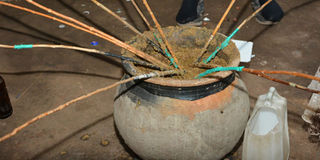From selling malwa to refined drinks

Rose Mbabazi has transformed her life through selling local brew. Photo by Godfrey Lugaaju.
What you need to know:
- The programme has seen Mbabazi transform financially, making Shs150,000 on average per week.
- This has enabled her to buy land and build a house as well as look after and pay school fees for her three children.
Rose Mbabazi, 40, stares blankly as our car pulls into an expansive space that passes for a compound.
It is a few minutes past 2pm and the afternoon sun is scorching hot. Beads of sweat roll off my forehead as I sink my tired body into a plastic chair in a dusty shed.
“You are welcome sir,” Mbabazi mumbles between a giggle and a smile.
“I thought you would be here by 12pm. I have been waiting since. Thank God you are here. I was about to leave. I had some errands but they can wait,” the mother of three says as she pulls a wooden bench to join me in the shed.
In 2000 after Mbabazi had tested the difficulties of bringing up a young family; she started thinking of a way through which she could sustainably meet the new demands.
For long, she had been a stay home mother only waiting for her husband to provide for the family.
However, the demands had piled up over time and they seemed to be beyond the fold of a man who was just depending on casual jobs to put food on the table.
“The money he [her husband] was getting could not sustain us [the family]. That is when I and himself agreed that I needed to start working to bring whatever I could afford to supplement his income,” Mbabazi, whose husband died last year, says.
Getting a job
Her search for a job landed her at Chez Johnson Hotel in Nakulabye, Kampala, where she served for a year as a waitress before moving to Kibuye, south west of Kampala and eventually to Ndeeba to form a drinking joint.
The joint mainly sold malwa, a local brew mixed with other alcoholic and non-alcoholic drinks.
This was the start of a journey that would introduce Mbabazi to new challenges and experiences but with little to talk of.
“I have been working from Monday to Monday. In all these years [about 17] I have always slept after midnight. However, until recently I had failed to transform my business into something tangible,” she says.
Stuck and seemingly tired of the lack of transformation, Mbabazi had for years sought a way out without finding any but was in 2011 drafted into a programme that she says has cast her into the transformation net.
“I met these people [Traditional African Beverages, a programme run under Nile Breweries] in 2005 but we did not keep in touch until 2015,” she says as she narrates her transition story from a malwa brewer to a seller of low cost products such as Chibuku, which seek to eliminate dangerous alcoholic drinks among low income earners.
The programme, according to Davidson Wadada, the project manager of Traditional African Beverages, targets people such as Mbabazi, who need to be transformed from selling unpurified and dangerous local brews that are potentially dangerous to their health.
Apart from health concerns, the programme, Wadada says, also seeks to not only improve people’s incomes but also recruit consumers to refined drinks that have been made fit for human consumption.
The programme has seen Mbabazi transform financially, making Shs150,000 on average per week.
This has enabled her to buy land and build a house as well as look after and pay school fees for her three children.
However, this has not been without challenges as Mbabazi has had to adjust to a life of working for longer hours with less time to rest.
This has negatively affected her health as she has on several occasions fallen ill due to fatigue and lack of enough rest.
Apart from the effects on her health, Mbabazi says, it is difficult to deal with people in the category she entertains because some of them usually get violent and impatient over small issues.
Mbabazi hopes to expand her business into something better because of the transformational story she has been experiencing.
Apart from Mbabazi, a number of other people including Joyce Tumukunde,40, and Resty Nayiga, 57, in Mayuni Zone, Ndeeba in Kampala have also, through Traditional African Beverages, had transformational stories that have seen their incomes improve from an average of Shs50,000 to about or more than Shs200,000.
Other change stories
Joyce Tumukunde: The mother of three started as a local brew seller (mainly malwa) before moving into low cost refined drinks such as Chibuku, under the Traditional African Beverages programme. Her business, which had since 2013 shown no sign of growth, has started to register some growth with daily sales revenue of Shs75,000. “As you can see this area had predominantly been selling malwa but sales have reducing with preference to better and recognised brands. This, according to Davidson Wadada, could be explained by the improvement in people’s income as well the raising health complications that have been exacerbated by consumption of non-refined brews.
Joyce Nayiga: She has been selling alcoholic drinks since 2007 having started with mainly local brew such omukomboti and malwa. However, she has had a total shift and only sells refined beers. This, she says, has substantially improved her income which on average stands between Shs150,000 and Shs80,000 on a bad day. The mother of two thoughtfully scavenged through the ruins of a failed marriage to start the business that would afford her the luxury to look after her children as well as establishing a home for herself and the children.




